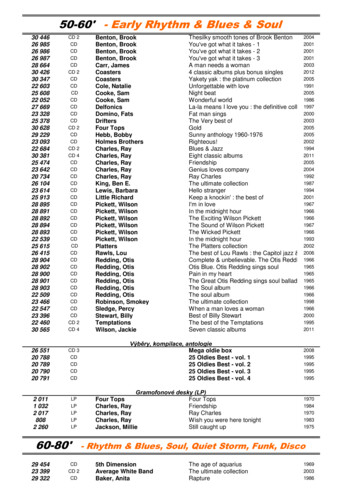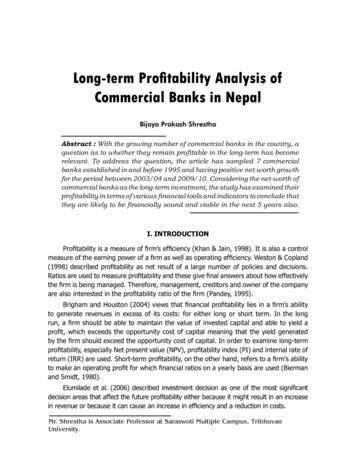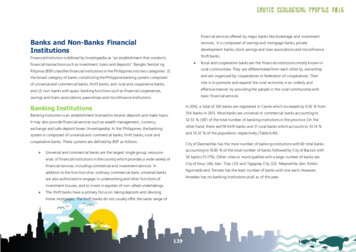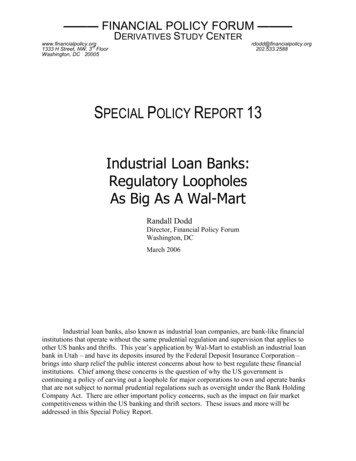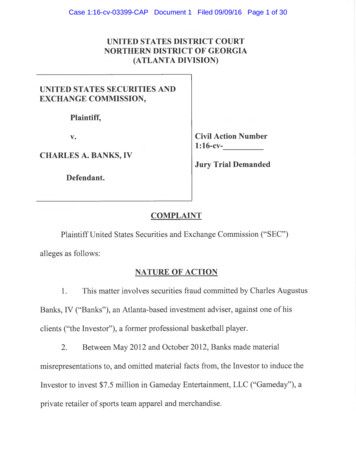
Transcription
Case 1:16-cv-03399-CAP Document 1 Filed 09/09/16 Page 1 of 30UNITED STATES DISTRICT COURTNORTHERN DISTRICT OF GEORGIA(ATLANTA DIVISION)UNITED STATES SECURITIES ANDEXCHANGE COMMISSION,Plaintiff,Civil Action Number1:16-cv-v.CHARLES A. BANKS,IVJury Trial DemandedDefendant.COMPLAINTPlaintiff United States Securities and Exchange Commission ("SEC")alleges as follows:NATURE OF ACTION1.This matter involves securities fraud committed by Charles AugustusBanks,IV ("Banks"), an Atlanta-based investment adviser, against one of hisclients ("the Investor"), a former professional basketball player.2.Between May 2012 and October 2012, Banks made materialmisrepresentations to, and omitted material facts from, the Investor to induce theInvestor to invest 7.5 million in Gameday Entertainment, LLC ("Gameday"), aprivate retailer of sports team apparel and merchandise.
Case 1:16-cv-03399-CAP Document 1 Filed 09/09/16 Page 2 of 303.Specifically, Banks represented to the Investor that Gameday intendedto offer two investors the opportunity to invest in a 15 million mezzanine debtand equity offering of the company, for which each investor would receive 12%interest (paid monthly), equity in Gameday, and a security interest in all ofGameday's assets. Banks also represented to the Investor that Gameday would useapproximately 5 million of the 15 million raised for Gameday's ongoingoperations and business development, and the remaining amount would be used topay off certain of its existing bank debt so that the Investor would have a first lienposition on Gameday's assets.4.Based on these representations, the Investor invested 7.5 million inGameday. The Investor instructed Banks to transfer that amount to Gameday froma line of credit that Banks controlled for the Investor. However, at the time Bankstransferred the money to Gameday, Banks knew that his representations to theInvestor were misleading and false.5.In particular, Banks knew that no other investor had invested in theoffering, and thus Gameday's existing bank debt would not be retired so that theInvestor could obtain a first lien position on Gameday's assets. Moreover, Banksdid not disclose to the Investor that he had prearranged to receive from Gameday a 225,000 fee for securing the Investor's investment or that he intended tomisappropriate a portion of the Investor's monthly return.2
Case 1:16-cv-03399-CAP Document 1 Filed 09/09/16 Page 3 of 306.Within a few days of Gameday receiving the Investor's money, Banksinstructed Gameday to pay him the 225,000 fee and divert to him 20% of theInvestor's monthly return, or 15,000 of the 75,000 that Gameday owed theInvestor monthly. Banks received these monthly payments for approximately twoyears. Banks also instructed Gameday to begin paying him over 600,000 invarious past due amounts that Gameday allegedly owed him.7.In June 2013, while continuing to act as the Investor's investmentadviser, Banks defrauded the Investor again by deceiving him into signing apersonal guarantee and subordination agreement on an approximately 6 millionbank line of credit to Gameday. To obtain the Investor's signature, Banks directedthat only the signature page of the guarantee document be sent to the Investor,while falsely representing to the Investor that it would reduce his existinginvestment risk in Gameday.8.In fact, the guarantee substantially increased the Investor's risk in theGameday investment. To further enrich himself, Banks also instructed Gamedayto divert to him a 3% "guarantee fee," or at least 180,000, that was due to theInvestor as consideration for providing the guarantee.9.By engaging in the conduct alleged in this Complaint, Banks violatedSection 17(a) of the Securities Act of 1933 ("Securities Act")[15 U.S.C. § 77a(a)];Section 10(b) of the Securities Exchange Act of 1934("Exchange Act") and Rule3
Case 1:16-cv-03399-CAP Document 1 Filed 09/09/16 Page 4 of 30lOb-5 thereunder [15 U.S.C. § 78j(b) and 17 C.F.R. § 240.1Ob-5]; and Sections206(1) and 206(2) of the Investment Advisers Act of 1940("Advisers Act")[15U.S.C. § 80b-6].JURISDICTION AND VENUE10.The Commission brings this action pursuant to Sections 20 and 22 ofthe Securities Act[15 U.S.C. §§ 77t and 77v], Sections 21(d) and 21(e) oftheExchange Act[15 U.S.C. §§ 78u(d) and 78u(e)], and Sections 209 and 214 oftheAdvisers Act[15 U.S.C. §§ 80b-9 and 80b-14] to enjoin Banks from engaging in thetransactions, acts, practices, and courses of business alleged in this complaint, andtransactions, acts, practices, and courses of business of similar purport and object, forcivil penalties, disgorgement, an officer and director bar, and for other equitablerelief.11.This Court has jurisdiction over this action pursuant to Section 22 oftheSecurities Act[15 U.S.C. § 77v], Sections 21(d), 21(e), and 27 ofthe Exchange Act[15 U.S.C. §§ 78u(d), 78u(e), and 78aa], Section 214 ofthe Advisers Act[15 U.S.C.§ 80b-14], and 28 U.S.C. § 1331.12.Venue is proper in this Court pursuant to Section 22(a)ofthe SecuritiesAct[15 U.S.C. § 77v], Section 27(a)ofthe Exchange Act[15 U.S.C. § 78aa],Section 214 ofthe Advisers Act[15 U.S.C. § 80b-14], and 28 U.S.C. § 1391.
Case 1:16-cv-03399-CAP Document 1 Filed 09/09/16 Page 5 of 3013.Banks, directly and indirectly, made use ofthe mails, and the means andinstrumentalities ofinterstate commerce in connection with the transactions, acts,practices, and courses of business alleged in this complaint.14.Certain ofthe transactions, acts, practices, and courses of businessconstituting violations ofthe Securities Act, the Exchange Act, and the Advisers Actoccurred within the jurisdiction ofthe United States District Court for the NorthernDistrict of Georgia. In addition, Banks resides in this judicial district.15.Banks, unless restrained and enjoined by this Court, will continue toengage in the transactions, acts, practices, and courses of business alleged in thiscomplaint, and in transactions, acts, practices, and courses of business ofsimilarpurport and object.DEFENDANT16.Charles Augustus Banks,IV, age 48, is a resident of Atlanta,Georgia. In 2012 and 2013, Banks owned (with a business partner) approximately42% of the outstanding shares in Gameday. Banks also portrayed himself publiclyas the Chairman of Gameday's Board of Directors.17.Banks's position as Chairman of Gameday, his ownership interest inthe company, and his past sourcing of Gameday's capital and financing gaveBanks influence over Gameday's CEO,Jeffrey J. Neal("Neal")5
Case 1:16-cv-03399-CAP Document 1 Filed 09/09/16 Page 6 of 3018.Banks is also the founder, a principal, and the majority owner ofTerroir Capital, LLC ("Terroir"), an exempt reporting adviser that manages at leasttwo private funds created by Banks. Those funds are Terroir Hotel &Resort FundII, L.P., and the Terroir Winery Fund, L.P.(collectively, the "Terroir Funds"). TheTerroir Funds own wineries and resort properties.19.Prior to forming Terroir, Banks was president and part owner of CSICapital Management, LLC ("CSI"), an investment adviser registered with theCommission. In Apri12011, SunTrust Investment Services, Inc.("SunTrust"), anSEC-registered investment adviser, purchased CSI.STATEMENT OF FACTSA.Banks Becomes The Investor's Investment Adviser20.Banks joined CSI in 1992.21.In 1997, Banks was an Executive Vice President at CSI. In thatposition, Banks successfully solicited the Investor to become an advisory client ofCSI.22.Banks was the Investor's primary point of contact with CSI.23.In 1999, Banks received an ownership interest in CSI.24.In 2001, Banks became the President of CSI.25.Over time, Banks's role with the Investor expanded to includeadvising the Investor on various business matters. Banks advised the Investor, for
Case 1:16-cv-03399-CAP Document 1 Filed 09/09/16 Page 7 of 30example, about investing in a fund called the Terroir Hotel and Resort Fund, L.P.Banks subsequently advised the Investor on other private investments, includinginvestments in the Terroir Funds.26.In 2007, Banks left his management role at CSI and formed Terroir.Banks continued, however, to have an ownership interest in CSI.27.Terroir became the adviser, directly or through affiliates, to theTerroir Funds.28.Although Banks was no longer in a management role at CSI, heremained CSI's primary point of contact with the Investor. Banks also continuedto facilitate CSI's communication with the Investor about the Investor's advisoryaccount with CSI.29.In addition, Banks continued to have access to the Investor's accountinformation at CSI and could view the Investor's investment holdings.30.In 2011, CSI sold its business, including the Investor's advisoryaccount, to SunTrust. Although Banks was not employed by SunTrust after theacquisition, he maintained a relationship of trust and confidence with the Investor.Banks also remained involved with the Investor's advisory account bycommunicating with SunTrust on the Investor's behalf regarding the investmentsthe Investor held at SunTrust.31.Banks also negotiated an exception from acovenant-not-to-compete
Case 1:16-cv-03399-CAP Document 1 Filed 09/09/16 Page 8 of 30with SunTrust that allowed Banks, with certain limitations, to continue advisinglegacy CSI clients, including the Investor, about potential business opportunities.32.Although the Investor knew that SunTrust had acquired CSI, theInvestor continued to rely on Banks for investment advice and to communicate onhis behalf with SunTrust, including directing SunTrust how to allocate the capitalin his account among various investments.33.The Investor believed that Banks continued to receive compensationfrom SunTrust for his services to him.34.Banks also continued to provide the Investor advice on privateinvestments, presenting to him various business opportunities for investment, aswell as continuing to serve in a more general role of advising the Investor onbusiness matters.35.Between 2007 and 2012, as a result of Banks's recommendations, theInvestor invested—in addition to the Gameday investment at issue here—approximately 14 million in the Terroir Funds. Through these investments, theInvestor paid management fees to Banks's company Terroir, in exchange forinvestment advice.36.The Investor also invested 1.1 million in Le Metier BeautyInvestment Partners, LLC ("Le Metier"), an entity affiliated with Banks that wasformed for the purpose of investing in Metier Tribeca, LLC, a luxury cosmetics 3
Case 1:16-cv-03399-CAP Document 1 Filed 09/09/16 Page 9 of 30company.B.The Gameday Offering37.In or about March 2012, Neal, Gameday's CEO,informed Banks thatGameday required additional financing to fund its ongoing operations.38.At that time, Banks not only was Gameday's Chairman and largestshareholder, but also its primary source for raising capital due to his connectionswith professional sports team owners and athletes.39.Neal proposed to Banks that Gameday solicit two investors to invest 7.5 million each for a term of five years, with each investor receiving in return12% interest per annum, paid monthly, and warrants convertible to 5%commonequity.40.Neal further proposed that Gameday use approximately 5 million ofthe total investment for working capital and the balance to pay off existing bankdebt so that both investors would have a senior security interest in Gameday'sinventory.41.Neal prepared a written presentation summarizing these terms tomarket the offering, including that Gameday intended to have two investors andthat proceeds of the offering would be used to retire Gameday debt, and sent thispresentation to Banks.42.Thereafter, Neal undertook efforts to find investors for the offeringE
Case 1:16-cv-03399-CAP Document 1 Filed 09/09/16 Page 10 of 30and, at the same time, he also requested that Banks solicit the Investor to be one ofthe two investors.43.Between approximately May 2012 and October 2012, Banks solicitedthe Investor to invest in Gameday's offering.44.Specifically, Banks conveyed to the Investor the terms of the offeringas proposed by Neal, emphasized that there would be very little risk due to thesecurity interest in the proposed collateral, and recommended that the Investormake the investment.45.In a May 9, 2012 email to the Investor, Banks touted the offering bytelling the Investor that he had a "very good opportunity to run by [him]" thatwould allow the Investor to "make a 10% spread" and "end up with equity in a SOm company."46.Banks also told the Investor that "[Gameday] has grown like crazyand we have a chance to land all the merchandising for the Dodgers, so we needcash to buy the inventory."47.Banks represented to the Investor that "the company would borrow 4-7 M at 12% interest .and the loan would be guaranteed and backed by[Gameday's] long term contracts."48.Banks added that, while he "ha[s] a hedge fund lined up to do thedeal," he wanted to give the Investor the opportunity because it would be a10
Case 1:16-cv-03399-CAP Document 1 Filed 09/09/16 Page 11 of 30"homerun" for him.49.In a subsequent August 13, 2012 email to the Investor, Banks againhighlighted the investment's lack of risk, writing:Jeff Neal, the CEO wants to replace the 7m loan we havewith [C]omerica [B]ank and add another 3M of capital. Hejust sent me the final offer from a hedge fund to provide 15M offinancing. Based on the deal he sent me I canget you a great deal (I can't do it because I am chairman). Ifyou loan the company 4-Sm (secured by our guaranteedcontracts and inventory) I can get you 12%interest .and Ican get them to pay the interest up front each year. Thiswould be a 3 year loan and paid in full at the end of threeyears. So you would take very little risk (because of thesecurity) and make 1.2-1.SM over the three years.50.Banks also assured the Investor that he would have a first lien positionon Gameday's collateral.51.The presentation materials that Banks gave to the Investor made clearthat this would occur as a result ofthe company's existing bank debt being paidoff.52.The Investor informed Banks that having a first lien position wasimportant to him.53.On September 5, 2012, Banks sent the Investor the writtenpresentation summarizing the offering that Neal had previously prepared and givento Banks.11
Case 1:16-cv-03399-CAP Document 1 Filed 09/09/16 Page 12 of 30C.Banks's Communications with SunTrust54.Shortly after Banks began soliciting the Investor to invest inGameday, Banks informed SunTrust of his recommendation.55.Banks told SunTrust that he had recommended to the Investor that heborrow his investment funds from SunTrust, secured by the assets in his advisoryaccount, so that the Investor could profit from the spread between the interest hewould need to pay SunTrust and what the Investor purportedly would earn inreturn from Gameday.56.SunTrust responded to Banks that it did not agree with the Investormaking the Gameday investment.57.SunTrust further objected to the Investor borrowing the funds toinvest in Gameday.58.SunTrust told Banks that its concerns arose from the lack of assurancethat Gameday would find a second investor and the result that the Investor wouldnot have a first security lien on Gameday's assets.59.SunTrust indicated to the Investor in an email dated September 28,2012, that SunTrust had not evaluated the soundness of the proposed Gamedayinvestment. SunTrust advised the Investor to obtain counsel to review theinvestment documents.60.Shortly after SunTrust's September 28, 2012 email to the Investor,12
Case 1:16-cv-03399-CAP Document 1 Filed 09/09/16 Page 13 of 30Banks reiterated to SunTrust his role with respect to the Investor's investments.61.Specifically, Banks first obtained the Investor's consent to open abank account in the Investor's name at Comerica Bank, and to move assets fromthe Investor's SunTrust account to Comerica.62.Using the new Comerica account as collateral, Banks arranged withComerica for the Investor to obtain a 10 million secured line of credit.63.Banks then sent an October 17, 2012 email to SunTrust, in which hewrote:Gentlemen,[the Investor] asked me to clarify how he iscomfortable going forward. [The Investor] has been happywith how we have done things for the last 16 years or so.He would like to see a quarterly report that is clean, simpleand to the point. Explanation is only necessary when thereare extenuating circumstances. . [The Investor] wouldlike me to receive the same communication he receives. Hewould like me to work with Todd [the Investor's SunTrustadviser] on the allocation and investment of his capital. Forprivate deals,[the Investor][sic] has set up an account at[C]omerica [B]ank. In the future when he wishes to investin a private deal he will review with me and then transfer thenecessary cash to the [C]omerica account where he willmake the investment. This way it is clear that [S]untrust isnot advising him in this capacity.64.Banks copied the Investor on this email and concluded it by asking theInvestor to "please respond that these are your wishes."65.The next day, the Investor replied by email to all of the originalrecipients, saying "[t]hat sounds good to me. Lets keep it simple. Thnx."13
Case 1:16-cv-03399-CAP Document 1 Filed 09/09/16 Page 14 of 30D.The Investor's Investment In Gameday66.In mid-October 2012, based on Banks's representations, the Investoragreed to invest 7.5 million in Gameday.67.On October 17, 2012,the Investor signed and returned to Neal a Noteand Warrant Purchase Agreement, a Secured Promissory Note, and a SecurityAgreement (collectively,"Gameday note"), which memorialized the Investor's 7.5 million investment in Gameday.68.The Note and Warrant Purchase Agreement ultimately included both:(1) a promissory note with a maturity of five years, paying interest of 12%perannum (paid monthly); and (2) a stock warrant convertible into 3% of Gamedaycommon equity.69.The Security Agreement represented that Gameday shall "keep the[c]ollateral free from any adverse claims, liens, security interests, or encumbrances(other than security interest of[the Investor])."70.At the same time, the Investor also signed and returned a Warrant toPurchase Units which gave the Investor the right to obtain a three percent equityinterest in Gameday at a nominal price within five years.71.Two days later, on October 19, 2012, Banks emailed Neal to tell himthat the Investor's funds for the investment would shortly be transferred toComerica Bank and directed Gameday to pay him a 3%origination fee, or14
Case 1:16-cv-03399-CAP Document 1 Filed 09/09/16 Page 15 of 30 225,000, for arranging the Investor's investment.72.In the same email, Banks also told Neal that Gameday needed to payhim or Hammer Holdings, LLC — a company that Banks jointly owns with anotherindividual —accrued fees and other amounts due, totaling 358,000.73.Finally, Banks informed Neal that, starting in 2013, his yearlyconsulting fee from Gameday would increase from 150,000 to 250,000 per year.74.At the time, Neal was telling Banks that he was on the verge ofobtaining funds from a group of foreign investors, who would constitute the secondinvestor for the offering.75.Neal asked Banks when the Investor's money would be transferred toGameday.76.Banks told Neal that he would not release the Investor's funds untilGameday had received the 7.5 million from the second investor because Banksknew the second investment was important to the Investor as it was necessary toenable Gameday to pay off its existing debt and give the Investor a first lien onGameday's assets.77.In an October 24, 2012 e-mail to Neal, Banks stated, "[the Investor] isVERY worried (I'm sure based on SunTrust's comments)that the [second investorisn't] real and that he's being misled into funding."78.However, the next day, October 25, 2012, Banks directed Comerica to15
Case 1:16-cv-03399-CAP Document 1 Filed 09/09/16 Page 16 of 30draw down 7.5 million on the Investor's line of credit and wire those funds on theInvestor's behalf to Gameday.79.Despite knowing that the second investment was important to theInvestor, at the time of his instructions to Comerica, Banks knew that Gamedayhad not received the second investment.80.Banks also knew that if he did not transfer the money at that time, hisapproval from the Investor for the wire transfer would expire and Banks mighthave difficulty obtaining a new approval from the Investor.81.Banks expressed this concern to Neal in an October 25, 2012 email, inwhich Banks told Neal: "I need to send [the Investor's] wire today or we have toget him on the phone to approve, which could be tough. If I send wire, pls [sic]don't touch until the [second investor] fund[s]."82.Gameday did not receive any funds from a second investor.83.Nevertheless, on November 1, 2012, Banks instructed Neal to pay himthe money they had agreed upon, including the 225,000 origination fee forobtaining the Investor's investment.84.On November 2, 2012, Banks told Neal by email to pay to him 20%of the Investor's monthly interest payments, or 15,000 of the 75,000 duemonthly to the Investor from Gameday.85.In instructing Neal to send him a portion of the Investor's monthly16
Case 1:16-cv-03399-CAP Document 1 Filed 09/09/16 Page 17 of 30return, Banks falsely told. Neal that he had obtained the Investor's agreement tothis arrangement.86.In a November 2, 2012 email to Neal, Banks wrote: "Btw,I got himto agree to pay me 20% on the Gameday deal. So every month I need 20% to go to[Banks's bank account]. Plus I get 20% of the stock he picks up (which I can tossinto the pot for you and me)."87.The Investor did not agree to pay Banks any portion of his interestpayments and Banks did not disclose to the Investor that Gameday would pay 20%of the Investor's interest payments to Banks. Banks also did not disclose to theInvestor that he was earning a 3%origination fee for the Investor's investment.88.In addition, Banks did not disclose to the Investor that the secondinvestment never materialized and that, as a result, Gameday had not paid off itsexisting bank debt.89.The Investor's investment in Gameday was subordinated toGameday's existing bank debt.90.The subordination of the Investor's investment in Gameday wascontrary to Banks's representations to the Investor and the Investor's wishes.91.At approximately this same time, Banks also recommended that theInvestor invest in Le Metier.92.In making this recommendation, Banks touted the company's fragrance17
Case 1:16-cv-03399-CAP Document 1 Filed 09/09/16 Page 18 of 30as the "hottest in New York at Bergdorf, Saks, and Niemans;" Banks noted his strongrelationship with the CEO ofthe company; and Banks claimed that he and anotherprofessional athlete, among others, were also investing in it.93.The Investor accepted Banks's recommendation to invest in Le Metier.94.On October 25;2012 —the same day that Banks transferred theInvestor's funds to Gameday —Banks also invested 1.1 million ofthe Investor'sfunds in Le Metier.95.Banks again used the Investor's line of credit at Comerica to make theinvestment.96.Banks received compensation for the Investor's investment in Le Metierby obtaining anon-binding letter ofintent from the company to award Banksexclusive distribution rights in Asia.E.The June 2013 Gameday Loan Guaranty and Subordination97.Even with the Investor's investment, Gameday needed additionalfunding.98.On December 4, 2012, Gameday made a 30-day loan to Banks of 950,000.99.Banks did not repay this loan.100. On December 20, 2012, Gameday made an additional, 30-day loan of 1.5 million to Hammer Holdings, a company that is controlled by Banks and
Case 1:16-cv-03399-CAP Document 1 Filed 09/09/16 Page 19 of 30another individual.101. Hammer Holdings did not repay this loan.102. In January 2013, Gameday defaulted on a loan the company had withComerica.103. This loan was personally guaranteed by the individual who controlledHammer Holdings with Banks, and was secured by that individual's assets ondeposit at the bank.104. After several months of negotiation, Comerica agreed to allowGameday to restructure the loan and establish a new line of credit, provided that itagain is secured by a personal guarantee.105. The individual who had guaranteed the original loan to Gameday nolonger wanted to be the guarantor.106. Beginning in May 2013, Banks and Neal undertook efforts to have theInvestor become the guarantor of the new financing from Comerica.107. In a May 5, 2013 email exchange with Neal, Banks stated,"[w]onderif I can get [the Investor] to replace [the original guarantor] on the guarantee?Without having to move more money over there?"108. In the same email exchange, Banks later observed that: "I need to becareful asking as I don't want to make him nervous. Ask [Comerica's loan officer]what he would need from [the Investor]."19
Case 1:16-cv-03399-CAP Document 1 Filed 09/09/16 Page 20 of 30109. Neal then emailed the Comerica loan officer, saying,"[Banks] saidthat he can get [the Investor] to take over the guaranty, but he doesn't want to haveto move any more money in right now. He thinks that would cause a red flag."110. On June 4, 2013, after Comerica had agreed to accept [the Investor's]guaranty without the Investor depositing additional funds, Banks directedComerica to send him the guaranty agreement and an agreement subordinating theInvestor's 7.5 million investment to the new line of credit.111. Banks also directed the Comerica loan officer to send only thesignature pages of both agreements to the Investor, who at the time was in Miami,Florida.112. On the same day, Banks told the Investor to sign and return thesignature pages.113. Although the pages had legends that said "Signature Page to [theInvestor] Guarantee" and "Signature Page to Subordination Agreement,"respectively, Banks did not tell the Investor that he was signing a guarantee and asubordination document.114. Instead, Banks informed the Investor in a text message that:"[o]n the good news front Gameday is crushing. We arechanging your 7.Sm loan to 6m. Paying it down 1.Sm.Sending you an amendment to the loan I need you to sendback when you get it."115. The Investor replied,"[w]hy are we changing the loan? If its20
Case 1:16-cv-03399-CAP Document 1 Filed 09/09/16 Page 21 of 30crushing should I get more of the company? Or at least what's agreed upon?I'm confused."116. Banks answered the Investor by stating:"[m]y fault for not explaining more clearly. Your exposureis going down but your upside remain and your monthlypayments remain. This just removes 1.Sm of risk for you.All great news. No downside."117. Following Banks's representations, the Investor signed and returnedthe signature pages without asking to read the full documents or questioning Banksfurther.118. Banks's statements to the Investor in the above text messages werefalse and deceptive.119. The Investor did not reduce his investment by 1.5 million by signingthe guarantee and subordination documents.120. Instead, by signing the documents, the Investor significantly increasedhis exposure to Gameday's risk of default, while subordinating his earlierinvestment to the new line of credit.121. Shortly after the new Comerica line of credit was secured, Banksdirected Gameday to pay him the 3% "guarantee fee," or at least 180,000, thatGameday was willing to pay the Investor as consideration for providing theguarantee.122. Banks did not disclose this 3% "guarantee fee" to the investor.21
Case 1:16-cv-03399-CAP Document 1 Filed 09/09/16 Page 22 of 30123. In exchange for providing investment advice to the Investor, Bankswas compensated by paying himself 20% of the Investor's monthly interestpayments.F.Banks's Fraud Is Exposed124. In or about March 2013,the Investor became involved in divorceproceedings.125. As part ofthose proceedings, the Investor's divorce attorneyquestioned Neal about the Investor's Gameday investment, including why theInvestor was receiving less than he was owed each month.126. Neal drafted a response in which he explained that 20% of theInvestor's monthly interest payment was being paid to Banks.127. However, when Neal previewed his response with Banks beforesending it to the Investor's attorney, Banks promptly told Neal to delete referenceto the 20%being paid to him.128. Over the next several weeks, the Investor's attorney pressed Neal foran explanation of the discrepancy.129. At one point, Banks told Neal to tell the attorney falsely that the 20%was being withheld as "deferred compensation."130. The Investor's attorney asked for documents reflecting the deferredcompensation arrangement. Banks and Neal could not provide the Investor's22
Case 1:16-cv-03399-CAP Document 1 Filed 09/09/16 Page 23 of 30attorney with such documents because they do not exist.131. Eventually, Banks and Neal disclosed that a portion of the Investor'sreturn had been diverted to Banks over the course ofthe investment.132. Following this disclosure, Banks agreed to pay the Investor theamount that he had diverted.133. However, instead of paying the money to the Investor himself, Banksinstructed Neal to pay the funds from Gameday and told Neal to credit the amountpaid to the Investor against unspecified amounts due to Banks from Gameday.134. To date, none of the Investor's investment has been returned to him.COUNTI—FRAUDViolations of Section 17(a)(1) of the Securities Actf15 U.S.C. 77q(a)(1)1135. Paragraphs 1 through 134 are realleged and incorporated herein byreference.136. Defendant Banks, acting with scienter, in the offer or sale of securitiesand by the use of means or instruments oftransportation or communication ininterstate commerce or by the use ofthe mails, directly or indirectly, employed adevice, scheme, or artifice to defraud.137. By reason ofthe foregoing, Banks, directly and indirectly, has violatedand, unless enjoined, will continue to violate Section 17(a)(1) ofthe Securities Act[15 U.S.C. § 77q(a)(1)].23
Case 1:16-cv-03399-CAP Document 1
Charles Augustus Banks, IV, age 48, is a resident of Atlanta, Georgia. In 2012 and 2013, Banks owned (with a business partner) approximately 42% of the outstanding shares in Gameday. Banks also portrayed himself publicly as the Chairman of Gameday's Board of Directors. 17. Banks's position as Chairman of Gameday, his ownership interest in
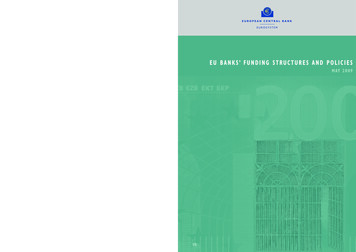
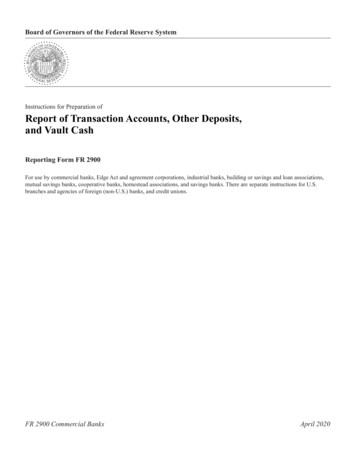
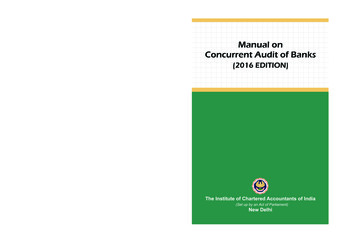
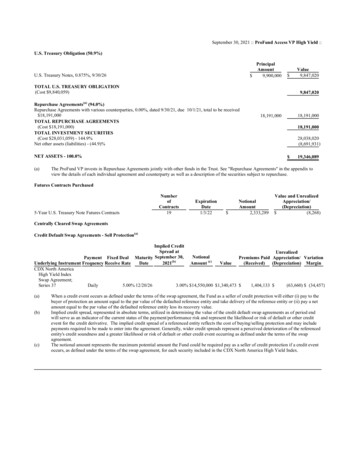
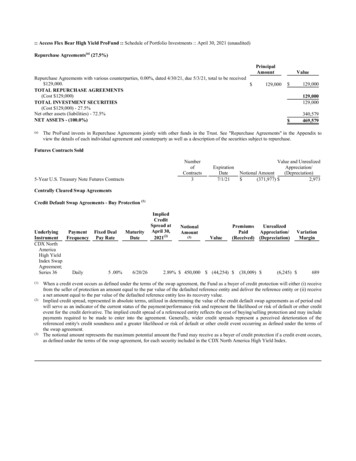
![The Book of the Damned, by Charles Fort, [1919], at sacred .](/img/24/book-of-the-damned.jpg)
